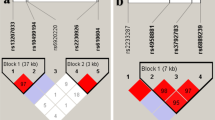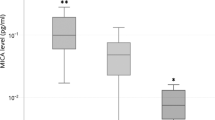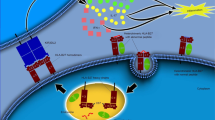Abstract
The genetic predisposition to a long-term efficacy of anti-tumor necrosis factor (TNF)α treatment in seronegative spondyloarthritis (SpA) was investigated by analysing the possible correlation between several single nucleotide gene polymorphisms and the retention rate of anti-TNFα therapies. We compared patients needing to switch the first anti-TNFα (Sw, No. 64) within at least 12 months of follow-up with patients not needing to switch (NSw, No. 123), observing at least 6 months of treatment to establish anti-TNFα failure, leading to treatment change. Response to treatment was evaluated by standardised criteria (BASDAI for axial involvement, DAS28-EULAR for peripheral involvement). The TNFα -308 A allele and the interleukin (IL)-6 -174GG homozygosis resulted as independent biomarkers predicting survival of the first anti-TNFα therapy in SpA patients (P=0.007, odds ratio (OR): 4.4, 95% confidence interval (CI)=1.5–13.1 and P=0.035, OR: 2.1, 95% CI=1.1–4.4). Also, the male gender (P=0.001, OR: 3.4, 95% CI=1.6–7.1) associated with the NSw phenotype, whereas no association was found either with the specific diagnosis or the predominant joint involvement.
This is a preview of subscription content, access via your institution
Access options
Subscribe to this journal
Receive 6 print issues and online access
$259.00 per year
only $43.17 per issue
Buy this article
- Purchase on Springer Link
- Instant access to full article PDF
Prices may be subject to local taxes which are calculated during checkout
Similar content being viewed by others
References
van der Heijde D, Sieper J, Maksymowych WP, Dougados M, Burgos-Vargas R, Landewé R et al. Assessment of SpondyloArthritis international Society. 2010 Update of the international ASAS recommendations for the use of anti-TNF agents in patients with axial spondyloarthritis. Ann Rheum Dis 2011; 70: 905–908.
Machado MA, Barbosa MM, Almeida AM, de Araújo VE, Kakehasi AM, Andrade EI et al. Treatment of ankylosing spondylitis with TNF blockers: a meta-analysis. Rheumatol Int 2013; 33: 2199–2213.
Maruotti N, Cantatore FP . Impact of biological therapy on spondyloarthritis. Eur J Clin Pharmacol 2014; 70: 1021–1027.
Saad AA, Ashcroft DM, Watson KD, Hyrich KL, Noyce PR, Symmons DP . Persistence with anti-tumour necrosis factor therapies in patients with psoriatic arthritis: observational study from the British Society of Rheumatology Biologics Register. Arthritis Res Ther 2009; 11: R52.
Kievit W, Fransen J, Adang EM, den Broeder AA, Bernelot Moens HJ, Visser H et al. Long-term effectiveness and safety of TNF-blocking agents in daily clinical practice: results from the Dutch Rheumatoid Arthritis Monitoring register. Rheumatology (Oxford) 2011; 50: 196–203.
Kiltz U, Heldmann F, Baraliakos, Braun J . Treatment of ankylosing spondylitis in patients refractory to TNF-inhibition: are there alternatives? Curr Opin Rheumatol 2012; 24: 252–260.
Wilson AG, Symons JA, McDowell TL, McDevitt HO, Duff GW . Effects of a polymorphism in the human tumor necrosis factor alpha promoter on transcriptional activation. Proc Natl Acad Sci USA 1997; 94: 3195–3199.
de Jong BA, Westendorp RG, Bakker AM, Huizinga TW . Polymorphisms in or near tumour necrosis factor (TNF)-gene do not determine levels of endotoxin-induced TNF production. Genes Immunol 2002; 3: 25–29.
O'Rielly DD, Roslin NM, Beyene J, Pope A, Rahman P . TNF-alpha-308 G/A polymorphism and responsiveness to TNF-alpha blockade therapy in moderate to severe rheumatoid arthritis: a systematic review and meta-analysis. Pharmacogenomics J 2009; 9: 161–167.
Lee YH, Ji JD, Bae SC, Song GG . Associations between tumor necrosis factor-alpha (TNF-alpha) -308 and -238 G/A polymorphisms and shared epitope status and responsiveness to TNF-alpha blockers in rheumatoid arthritis: a meta analysis update. J Rheumatol 2010; 37: 740–746.
Song GG, Bae SC, Kim JH, Lee YH . Association between TNF-α promoter -308 A/G polymorphism and rheumatoid arthritis: a meta-analysis. Rheumatol Int 2014; 34: 465–471.
Tong Q, Zhao L, Qian XD, Zhang LL, Xu X, Dai SM et al. Association of TNF-α polymorphism with prediction of response to TNF blockers in spondyloarthritis and inflammatory bowel disease: a meta-analysis. Pharmacogenomics 2013; 14: 1691–1700.
Murdaca G, Gulli R, Spanò F, Lantieri F, Burlando M, Parodi A et al. TNF-α gene polymorphisms: association with disease Susceptibility and response to anti-TNF-α treatment in psoriatic arthritis. J Invest Dermatol 2014; 34: 2503–2509.
Lee YH, Bae SC, Song GG . Functional FCGR3A 158 V/F and IL-6 -174 C/G polymorphisms predict response to biologic therapy in patients with rheumatoid arthritis: a meta-analysis. Rheumatol Int 2014; 34: 1409–1415.
Tutuncu Z, Kavanaugh A, Zvaifler N, Corr M, Deutsch R, Boyle D . Fcgamma receptor type IIIA polymorphisms influence treatment outcomes in patients with infl ammatory arthritis treated with tumor necrosis factor alpha-blocking agents. Arthritis Rheum 2005; 52: 2693–2696.
Morales-Lara MJ, Conesa-Zamora P, García-Simón MS, Pedrero F, Santaclara V, Perez-Guillermo M et al. Association between the FCGR3 A V158F polymorphism and the clinical response to infliximab in rheumatoid arthritis and spondyloarthritis patients. Scand J Rheumatol 2010; 39: 518–520.
Fabbroni M, Cantarini L, Caso F, Costa L, Pagano VA, Frediani B et al. Drug retention rates and treatment discontinuation among anti-TNF-α agents in psoriatic arthritis and ankylosing spondylitis in clinical practice. Mediators Inflamm 2014; 2014: 862969.
Rudwaleit M, van der Heijde D, Landewé R, Akkoc N, Brandt J, Chou CT et al. The Assessment of SpondyloArthritis International Society classification criteria for peripheral spondyloarthritis and for spondyloarthritis in general. Ann Rheum Dis 2011; 70: 25–31.
Fransen J, Antoni C, Mease PJ, Uter W, Kavanaugh A, Kalden JR et al. Performance of response criteria for assessing peripheral arthritis in patients with psoriatic arthritis: analysis of data from randomised controlled trials of two tumour necrosis factor inhibitors. Ann Rheum Dis 2006; 65: 1373–1378.
Braun J, Davis J, Dougados M, Sieper J, van der Linden S, van der Heijde D . First update of the international ASAS consensus statement for the use of anti-TNF agents in patients with ankylosing spondylitis. Ann Rheum Dis 2006; 65: 316–320.
Fabris M, Di Poi E, D'Elia A, Damante G, Sinigaglia L, Ferraccioli G . Tumor necrosis factor-alpha gene polymorphism in severe and mild-moderate rheumatoid arthritis. J Rheumatol 2002; 29: 29–33.
Al-Ansari AS, Ollier WE, Villarreal J, Ordi J, Teh LS, Hajeer AH . Tumor necrosis factor receptor II (TNFRII) exon 6 polymorphism in systemic lupus erythematosus. Tissue Antigens 2000; 55: 97–99.
Fabris M, Quartuccio L, Lombardi S, Saracco M, Atzeni F, Carletto A et al. The CC homozygosis of the -174G>C IL-6 polymorphism predicts a lower efficacy of rituximab therapy inrheumatoid arthritis. Autoimmun Rev 2012; 11: 315–320.
Esteve E, Villuendas G, Mallolas J, Vendrell J, López-Bermejo A, Rodríguez M et al. Polymorphism in the interleukin-6 receptor gene are associated with body mass index and with characteristics of the metabolic syndrome. Clin Endocrinol(Oxford) 2006; 65: 88–91.
Quartuccio L, Fabris M, Pontarini E, Salvin S, Zabotti A, Benucci M et al. The 158VV Fcgamma receptor 3A genotype is associated with response to rituximab in rheumatoid arthritis: results of an Italian multicentre study. Ann Rheum Dis 2014; 73: 716–721.
Sugiura Y, Niimi T, Sato S, Yoshinouchi T, Banno S, Naniwa T et al. Transforming growth factor beta1 gene polymorphism in rheumatoid arthritis. Ann Rheum Dis 2002; 61: 826–828.
Umićević Mirkov M, Janss L, Vermeulen SH, van de Laar MA, van Riel PL, Guchelaar HJ et al. Estimation of heritability of different outcomes for genetic studies of TNFi response in patients with rheumatoid arthritis. Ann Rheum Dis e-pub ahead of print 11 August 2014.
Hreggvidsdottir HS, Noordenbos T, Baeten DL . Inflammatory pathways in spondyloarthritis. Mol Immunol 2014; 57: 28–37.
Panoulas VF, Stavropoulos-Kalinoglou A, Metsios GS, Smith JP, Milionis HJ, Douglas KM et al. Association of interleukin-6 (IL-6)-174G/C gene polymorphism with cardiovascular disease in patients with rheumatoid arthritis: the role of obesity and smoking. Atherosclerosis 2009; 204: 178–183.
Fishman D, Faulds G, Jeffery R, Mohamed-Ali V, Yudkin JS, Humphries S et al. The effect of novel polymorphisms in the interleukin-6 (IL-6) gene on IL-6 transcription and plasma IL-6 levels, and an association with systemic-onset juvenile chronic arthritis. J Clin Invest 1998; 102: 1369–1376.
Pedersen SJ, Sørensen IJ, Garnero P, Johansen JS, Madsen OR, Tvede N et al. ASDAS, BASDAI and different treatment responses and their relation to biomarkers of inflammation, cartilage and bone turnover in patients with axial spondyloarthritis treated with TNF -inhibitors. Ann Rheum Dis 2011; 70: 1375–1381.
Schoels MM, van der Heijde D, Breedveld FC, Burmester GR, Dougados M, Emery P et al. Blocking the effects of interleukin-6 in rheumatoid arthritis and other inflammatory rheumatic diseases: systematic literature review and meta-analysis informing a consensus statement. Ann Rheum Dis 2013; 72: 583–589.
Sieper J, Porter-Brown B, Thompson L, Harari O, Dougados M . Assessment of short-term symptomatic efficacy ot tocilizumab in ankylosing spondylitis: results of randomized, placebo controlled trials. Ann Rheum Dis 2014; 73: 95–100.
Brulhart L, Nissen MJ, Chevallier P, Gabay C . Tocilizumab in a patient with ankylosing spondylitis and Crohn's disease refractory to TNF antagonists. Joint Bone Spine 2010; 77: 625–626.
Luc M, Gossec L, Ruyssen-Witrand A, Salliot C, Duclos M, Guignard S et al. C-reactive protein predicts tumor necrosis factor-alpha blocker retention rate in axial ankylosing spondylitis. J Rheumatol 2007; 34: 2078–2081.
Jančić I, Arsenović-Ranin N, Sefik-Bukilica M, Zivojinović S, Damjanov N, Spasovski V et al. -174G/C interleukin-6 gene promoter polymorphism predicts therapeutic response to etanercept in rheumatoid arthritis. Rheumatol Int 2013; 33: 1481–1486.
Dávila-Fajardo CL, Márquez A, Pascual-Salcedo D, Moreno Ramos MJ, García-Portales R, Magro C et al. Confirmation of -174G/C interleukin-6 gene promoter polymorphism as a genetic marker predicting antitumor necrosis factor treatment outcome. Pharmacogenet Genomics 2014; 24: 1–5.
Cañete JD, Suárez B, Hernández MV, Sanmartí R, Rego I, Celis R et al. Influence of variants of Fc gamma receptors IIA and IIIA on the American College of Rheumatology and European League Against Rheumatism responses to anti-tumour necrosis factor alpha therapy in rheumatoid arthritis. Ann Rheum Dis 2009; 68: 1547–1552.
Ramírez J, Fernández-Sueiro JL, López-Mejías R, Montilla C, Arias M, Moll C et al. FCGR2A/CD32A and FCGR3A/CD16A variants and EULAR response to tumor necrosis factor-α blockers in psoriatic arthritis: a longitudinal study with 6 months of followup. J Rheumatol 2012; 39: 1035–1041.
Kristensen LE, Karlsson JA, Englund M, Petersson IF, Saxne T, Geborek P . Presence of peripheral arthritis and male sex predicting continuation of anti-tumor necrosis factor therapy in ankylosing spondylitis: an observational prospective cohort study from the South Swedish Arthritis Treatment Group Register. Arthritis Care Res 2010; 62: 1362–1369.
Zufferey P, Ghosn J, Becce F, Ciurea A, Aubry-Rozier B, Finckh A et al. Anti-tumor necrosis factor drug survival in axial spondyloarthritis is independent of the classification criteria. Rheumatol Int 2014; 35: 295–302.
Paramarta JE, De Rycke L, Ambarus CA, Tak PP, Baeten D . Undifferentiated spondyloarthritis vs ankylosing spondylitis and psoriatic arthritis: a real-life prospective cohort study of clinical presentation and response to treatment. Rheumatology (Oxford) 2013; 52: 1873–1878.
Baeten D, Breban M, Lories R, Schett G, Sieper J . Are spondylarthritides related but distinct conditions or a single disease with a heterogeneous phenotype? Arthritis Rheum 2013; 65: 12–20.
Wendling D, Guillot X, Prati C . The IL-23/Th17 pathway in spondyloarthritis: The Royal Road? Joint Bone Spine 2014; 65: 1–4.
Acknowledgements
Dr CF is currently receiving a fellowship from the University-Hospital of Udine.
Author information
Authors and Affiliations
Corresponding author
Ethics declarations
Competing interests
The authors delare no conflicts of intrest.
Rights and permissions
About this article
Cite this article
Fabris, M., Quartuccio, L., Fabro, C. et al. The -308 TNFα and the -174 IL-6 promoter polymorphisms associate with effective anti-TNFα treatment in seronegative spondyloarthritis. Pharmacogenomics J 16, 238–242 (2016). https://doi.org/10.1038/tpj.2015.49
Received:
Revised:
Accepted:
Published:
Issue Date:
DOI: https://doi.org/10.1038/tpj.2015.49
This article is cited by
-
IL6 genetic variants haplotype is associated with susceptibility and disease activity but not with therapy response in patients with inflammatory bowel disease
International Journal of Colorectal Disease (2021)
-
Applying precision medicine to unmet clinical needs in psoriatic disease
Nature Reviews Rheumatology (2020)
-
TNF-α Promoter Polymorphisms Predict the Response to Etanercept More Powerfully than that to Infliximab/Adalimumab in Spondyloarthritis
Scientific Reports (2016)



